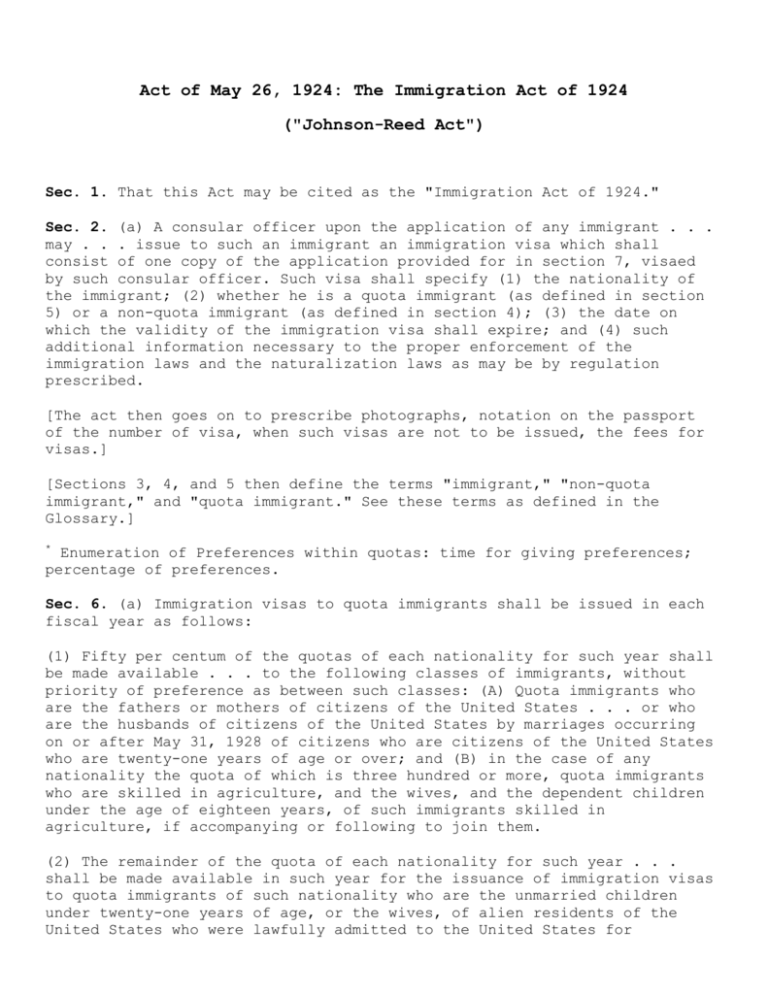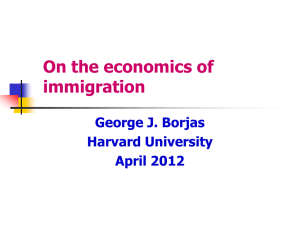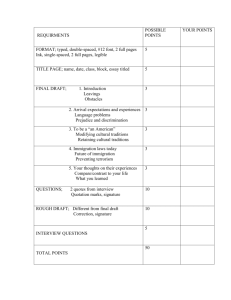Johnson-Reed Act - Immigration ProCon.org
advertisement

Act of May 26, 1924: The Immigration Act of 1924 ("Johnson-Reed Act") Sec. 1. That this Act may be cited as the "Immigration Act of 1924." Sec. 2. (a) A consular officer upon the application of any immigrant . . . may . . . issue to such an immigrant an immigration visa which shall consist of one copy of the application provided for in section 7, visaed by such consular officer. Such visa shall specify (1) the nationality of the immigrant; (2) whether he is a quota immigrant (as defined in section 5) or a non-quota immigrant (as defined in section 4); (3) the date on which the validity of the immigration visa shall expire; and (4) such additional information necessary to the proper enforcement of the immigration laws and the naturalization laws as may be by regulation prescribed. [The act then goes on to prescribe photographs, notation on the passport of the number of visa, when such visas are not to be issued, the fees for visas.] [Sections 3, 4, and 5 then define the terms "immigrant," "non-quota immigrant," and "quota immigrant." See these terms as defined in the Glossary.] * Enumeration of Preferences within quotas: time for giving preferences; percentage of preferences. Sec. 6. (a) Immigration visas to quota immigrants shall be issued in each fiscal year as follows: (1) Fifty per centum of the quotas of each nationality for such year shall be made available . . . to the following classes of immigrants, without priority of preference as between such classes: (A) Quota immigrants who are the fathers or mothers of citizens of the United States . . . or who are the husbands of citizens of the United States by marriages occurring on or after May 31, 1928 of citizens who are citizens of the United States who are twenty-one years of age or over; and (B) in the case of any nationality the quota of which is three hundred or more, quota immigrants who are skilled in agriculture, and the wives, and the dependent children under the age of eighteen years, of such immigrants skilled in agriculture, if accompanying or following to join them. (2) The remainder of the quota of each nationality for such year . . . shall be made available in such year for the issuance of immigration visas to quota immigrants of such nationality who are the unmarried children under twenty-one years of age, or the wives, of alien residents of the United States who were lawfully admitted to the United States for permanent residence. . . . Sec. 7. [Gives an elaborate description of duplicate application of visas and the form of visas, copies to be kept for records, statements required as to membership in classes of aliens excluded, statements as to exemptions from exclusion and the various verifications as to signatures, ages, fees paid, etc.] Sec. 8. [Covers when a consular official may issue a nonquota immigration visa.] Sec. 9. [Covers the issuance of nonquota visas and quota visas to relatives.] Sec. 10. (a) Any alien about to depart temporarily from the United States may make application to the Commissioner of Immigration and Naturalization for a permit to reenter the United States stating the length of his intended absence, and the reasons therefor. [Subsections (b)-(g) detail the issuance of reentry permits, their fees, effects, and treaty-merchant reentry permits.] Sec. 11. (a) The annual quota of any nationality shall be 2 per centum of the number of foreign-born individuals of such nationality resident in continental United States as determined by the United States census of 1890, but the minimum quota of any nationality shall be 100. [Subsections (b)-(g) detail how national origin is determined, presidential proclamation of quotas, monthly issuances of visa limits, and the issue of visas to nonquota immigrants.] Sec. 12. (a) For the purpose of this Act nationality shall be determined by country of birth, treating as separate countries the colonies, dependencies, or self-governing dominions for which separate enumeration was made in the United States census of 1890 and which was not included in the enumeration for the country to which such colony or dependency belonged. . . . [Subsection (b) requires the secretaries of state and commerce, with the attorney general, to issue jointly statements as to the numbers of the various nationalities as of the census of 1890. Subsection (c) covers the effects of changes in the political boundaries of foreign countries; (d) and (e) cover the issuance of monthly statements and the proclamation of quotas available.] Sec. 13. (a) No immigrant shall be admitted . . . unless he (1) has an unexpired immigration visa . . .; (2) is of the nationality specified in the visa; (3) is a nonquota immigrant if specified in the visa as such; (4) is a preference-quota immigrant if specified . . . as such; and (5) is otherwise admissible under the immigration laws. [Subsection 13(b) covers such details as readmission of aliens without visas.] (c) No alien ineligible to citizenship shall be admitted to the United States unless such alien (1) is admissible as a non-quota immigrant under the provisions of subdivisions (b), (d) or (e) of section 4, or (2) is the wife, or the unmarried child under 18 years of age, of an immigrant admissible . . ., and is accompanying or following to join him, or (3) is not an immigrant as defined in section 3. . . . (e) No quota immigrant shall be admitted under subdivision (d) if the entire number of immigrant visas which may be issued to quota immigrants of the same nationality for the fiscal year has already been issued. . . . Sec. 14. [Covers deportation procedures for alien children under age sixteen.] Sec. 15. [Covers the maintenance of exempt status.] Sec. 16. [Covers when it is unlawful to bring to the United States by water an alien, including the fines or prison penalties thus engendered.] Sec. 17. [Covers the commissioner of Immigration and Naturalization's authority to issue rules and regulations to implement the act.] Sec. 18. If a quota immigrant of any nationality having an immigration visa is excluded from admission to the United States under the immigration laws and deported, or does not apply for admission to the United States before the expiration of the validity of the immigration visa, or if any alien of any nationality having an immigration visa issued to him as a quota immigrant is found not to be a quota immigrant, no additional immigration visa shall be issued in lieu thereof to any other immigrant. Sec. 19. No alien seaman excluded from admission . . . shall be permitted to land . . . except temporarily for medical treatment, or pursuant to such regulations as the Attorney General may prescribe for the ultimate departure, removal, or deportation of such alien from the United States. [Subsequent sections and subsections detail the detention of seamen on board vessels, penalties, evidence of failure to detain or deport, deportation procedures, preparation or use of documents and the offenses in connection with forging, counterfeiting, immigration visas or permits, false statements, and so on.] Sec. 23. Whenever any alien attempts to enter the United States the burden of proof shall be upon the alien to establish that he is not subject to exclusion under any of the provisions of the immigration laws. [Sections 24 to 32 essentially repeat prior law as to steamship line fines, prevention of alien landings, and so on of the Immigration Act of 1917.] Source: 43 Stat. 153; 8 U.S.C. 201. ____________________ * As amended by Act of May 29, 1928 ( 45 Stat. 1009). Original provision enumerated unmarried young children, parents and spouses of U.S. citizens and immigrants skilled in agriculture.




